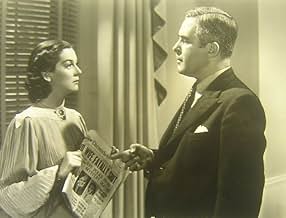AVALIAÇÃO DA IMDb
7,2/10
1 mil
SUA AVALIAÇÃO
Adicionar um enredo no seu idiomaA domineering woman marries a wealthy man for his money, and then uses her position to further her own ambitions for money and power.A domineering woman marries a wealthy man for his money, and then uses her position to further her own ambitions for money and power.A domineering woman marries a wealthy man for his money, and then uses her position to further her own ambitions for money and power.
Stanley Andrews
- Police Officer Davis
- (não creditado)
Mary Blake
- Undetermined Secondary Role
- (não creditado)
James P. Burtis
- Moving Man
- (não creditado)
Wallis Clark
- Mr. Burton
- (não creditado)
Nell Craig
- Nurse Rigby
- (não creditado)
Mary Lou Dix
- Undetermined Secondary Role
- (não creditado)
- Direção
- Roteiristas
- Elenco e equipe completos
- Produção, bilheteria e muito mais no IMDbPro
Enredo
Você sabia?
- Citações
Harriet Craig: Nobody can know another human being well enough to trust him.
- ConexõesReferenced in The Silent Feminists: America's First Women Directors (1993)
Avaliação em destaque
George Kelly's Pulitzer Prize winning 1925 play receives its second screen treatment under the direction of Dorothy Arzner, with Rosalind Russell as the materialistic and calculating Harriet Craig and John Boles as her romantically naive husband. The story is very simple, Harriet cares more about House than Home and marries, quite openly, for financial security and social status. She regards other aspects of family and marriage such as sex, children, and simple comforts of home and family with indifference. Her living room is the outward expression of her soul, and she guards it tenaciously, forbidding anyone to muss a cushion, foul it with cigarette smoke, shift the position of a vase, drop a speck of dirt. As the drama unfolds, the significance of this setting is laid on with a trowel. Harriet's selfishness finally does her in as the blindly loving husband comes to his senses. It's a fascinating story because Harriet is an extreme example of a certain human type - the materialistic, status-obsessed neat freak. Two famous examples: Joan Crawford, known for her obsessive cleanliness (and of course her own interpretation of Harriet in the 1950 film version of this play); Martha Stewart, known for her devotion to the well-kept house and exacting attention to domestic appearances and presentations. The flaw of the film is carried over from the flaw in the original play - the husband's character is too arbitrary. It is not enough for us to be told by sundry characters that sweet Mr. Craig never should have fallen in love with a shrew like Harriet and that love is blind. His transformation from devotion to sudden doubt to violent hostility happens too quickly and neatly, but the reasons for his progression are understandable.
This treatment is more or less a photographed stage play which is not so bad here because the play in question made its points by various combinations of talking heads. The key to winning over a film audience under these circumstances lies not so much in cinematic derring do than in good casting and this film serves it up deliciously. Russell is flawless, playing what could have been caricature as a three-dimensional human being. She is no better or worse than Joan Crawford would be 14 years later, just different. As the house maid, Jane Darwell fits the role like a foot in a custom built shoe. Her best moments come when her character switches personality depending on whether she is talking to Mr. or Mrs. Craig; the shifting attitude helps establish the nature of the relationships in the story. Especially good is John Boles who has never registered to me as an actor. He usually comes across as a barely animated cardboard cutout, but here he is set loose on an emotionally charged arc and makes it all the way without a stumble. Billie Burke again proves what a versatile actress she could be as the friendly widow next door.
This treatment is more or less a photographed stage play which is not so bad here because the play in question made its points by various combinations of talking heads. The key to winning over a film audience under these circumstances lies not so much in cinematic derring do than in good casting and this film serves it up deliciously. Russell is flawless, playing what could have been caricature as a three-dimensional human being. She is no better or worse than Joan Crawford would be 14 years later, just different. As the house maid, Jane Darwell fits the role like a foot in a custom built shoe. Her best moments come when her character switches personality depending on whether she is talking to Mr. or Mrs. Craig; the shifting attitude helps establish the nature of the relationships in the story. Especially good is John Boles who has never registered to me as an actor. He usually comes across as a barely animated cardboard cutout, but here he is set loose on an emotionally charged arc and makes it all the way without a stumble. Billie Burke again proves what a versatile actress she could be as the friendly widow next door.
- mukava991
- 2 de ago. de 2008
- Link permanente
Principais escolhas
Faça login para avaliar e ver a lista de recomendações personalizadas
Detalhes
Bilheteria
- Orçamento
- US$ 300.000 (estimativa)
- Tempo de duração1 hora 13 minutos
- Cor
- Proporção
- 1.37 : 1
Contribua para esta página
Sugerir uma alteração ou adicionar conteúdo ausente

Principal brecha
By what name was Mulher Sem Alma (1936) officially released in Canada in English?
Responda























